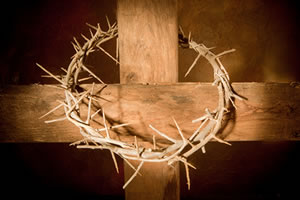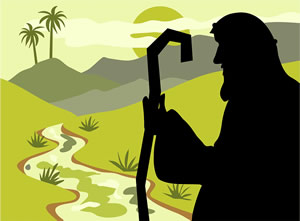Cross, Crook, and Crown
Cross: Psalms 22
 My God, My God, why have You forsaken Me?
My God, My God, why have You forsaken Me?
Why are You so far from helping Me,
And from the words of My groaning?
2 O My God, I cry in the daytime, but You do not hear;
And in the night season, and am not silent. Psalms 22:1-2
In Psalms 22, we have the feelings of Christ as He looks back at what He endured upon Calvary's cross. The Psalm's heading states that it was set to the tune of “The Deer of the Dawn.” The morning dawn would signify that the night of sorrow had past and that a new day had begun. The figure of a deer brings before us an image of an animal with a keen sense of its surroundings and sensitive to any threat of danger. In contrast, a sheep lacks the survival instincts of a deer. When the topic is atonement, a lamb is found to best represent the submissive nature of Jesus willing to die for our redemption. Whereas a deer is better suited to show the internal feelings of Christ who was keenly aware of everything He endured on the cross.
Strong bulls of Bashan (vs 12) would refer to the leaders of Israel who had a deep-seated hatred of Jesus. Dogs (vs 16) were ceremonially unclean animals in Jewish law and would represent the Roman Gentiles. In verse 21 subject changes from cries of suffering to praises of redemption. Psalms 22 ends with the words, That He has done this. This reminds us of the final words of our Savior upon the cross when, He said, “It is finished!” And bowing His head, He gave up His spirit. John 19:30. While some might think the expression, “It is finished!”, is a cry of defeat, it is exactly the opposite. It is a victory shout (Tetelestai, Τετέλεσται) proclaiming He had satisfied all the claims of a holy God with respect to sin. It signified the completion of redemption. It was a Greek expression stating that a debt had been paid in full. 1
Crook: Psalms 23
The Lord is my shepherd;
 I shall not want.
I shall not want.
He makes me to lie down in green pastures;
He leads me beside the still waters.
He restores my soul;
He leads me in the paths of righteousness
For His name’s sake.. Psalms 23:1-3
Psalms 23 is the present-day care of Christ for His flock. It is not a distant concern, but a care that Christ has for each one of us individually. Here we find the personal words, such as, me, my, and I. The word me occurs seven times. It is blessed to have the sense that Jesus is personally concerned about me as an individual. Even though we sometimes must endure trials and pass though the valley of the shadow of death, we know that, when our journey on earth is over, we will dwell in the house of the Lord Forever.
Crown: Psalms 24
 Lift up your heads, O you gates!
Lift up your heads, O you gates!
And be lifted up, you everlasting doors!
And the King of glory shall come in.
Who is this King of glory?
The Lord strong and mighty,
The Lord mighty in battle. Psalms 24:7-8
This Psalm looks forward to when Jesus reigns as king. The sufferings of Psalms 22 and Christ’s present-day care for the flock of Psalms 23 will then be past. This psalm gives us a view of the future when the everlasting doors will be opened to Jesus, the King of Glory.
Paul encourages Timothy to be faithful in his service, keeping in mind the coming of Jesus who will judge and reign in His kingdom.
I charge you therefore before God and the Lord Jesus Christ, who will judge the living and the dead at His appearing and His kingdom: 2 Timothy 4:1











